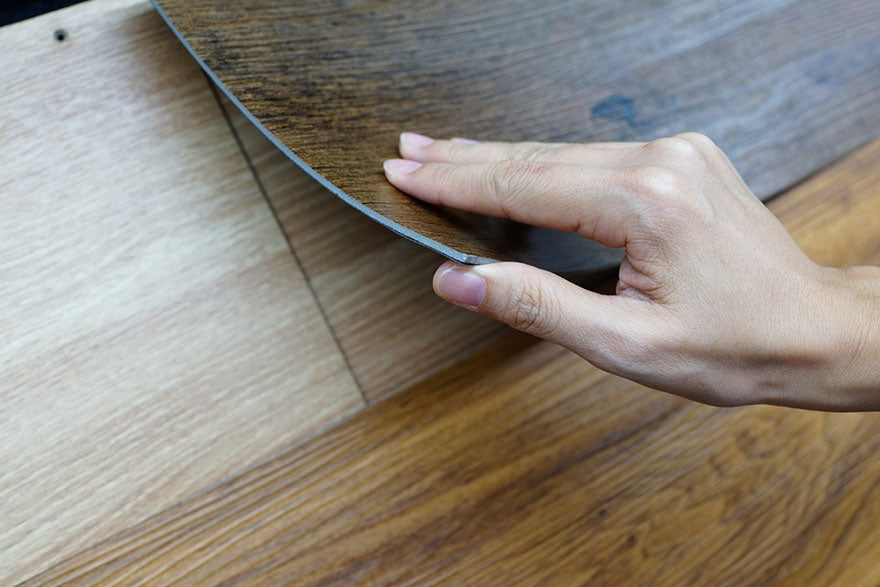
What Is LVP Flooring Made Of?
Source: TY Lim/shutterstock.com
Luxury Vinyl Planking (LVP) is a flooring choice that's been embraced by consumers and commercial entities alike. It's a durable, attractive, affordable way to spruce up nearly any space.
Vinyl is the primary material in vinyl plank flooring. Its multiple layers offer unique protection to your home or business. Familiarize yourself with LVP flooring by learning what it's made of below.
Shop WC Supply for Vinyl Plank FlooringWhat Is LVP Flooring?
LVP flooring is a multi-layered plank made of textured vinyl, which is highly pliable. Images printed onto the flexible planks can also complement your next kitchen remodel. For example, RTA cabinets and wholesale cabinets in white or brown colors can coordinate with LVP floorings of the same color, such as marble or wood-grain hues. Both the cabinets and flooring are durable materials in their own right.
There are four main layers to LVP flooring. The layers built into LVP flooring can vary between manufacturers, but most designs have these basic similarities.
Browse Our Selection of Wholesale CabinetsBase Layer
The base layer pressed against the subfloor performs all the hard work. It offers waterproof characteristics along with microbial resistance.
Some designs add foam to the base layer. This feature acts as an underlayment, which pads the flooring and improves acoustics. In general, added layers can make a flooring choice more expensive yet highly durable through the years. If you have questions, a WC Supply flooring specialist can help explain the layers in your chosen product.
Core Section
The core section is where you'll find the bulk of the vinyl structure. It's waterproof and forms the thickest part of the plank. In fact, you'll find the click-lock system at this layer, which allows the planks to be connected in a floating configuration. The locking mechanism provides another layer of protection against water infiltration.
At WC Supply, some of our brands come with stone cores that work well with the surrounding vinyl flexibility. The vinyl can expand and contract as necessary while a home warms and cools through the seasons. This easy movement prevents cracking and separation between planks. Vinyl stacked in layers along with a stone core is remarkably strong.

Source: l i g h t p o e t/shutterstock.com
Aesthetic Choices
One of the most distinctive features of LVP flooring is its versatility in its overall appearance. LVP can have almost any image or texture added to its surface. Stone, tile, wood and other designs are possible.
Because flooring projects are usually customized orders, you can explore the images available with each brand. Get that hardwood look or top off a grand room with a marble-looking floor. You'll still have the best features of vinyl but with a sophisticated appeal.
Wear or Top Layer
There's a transparent layer across the top of the plank, referred to as the wear layer. Most products come with scratch and stain resistance, including WC Supply's thick wear layer. The finish itself should never look damaged because of the wear layer that takes on everyday foot traffic.
Some manufacturers add UV or ultraviolet protection to the wear layer. This feature prevents premature fading from sunlight exposure. You can allow sunlight to pour into your home because the UV feature stops any damage impacting the look of your flooring.

Source: Dmitry Kalinovsky/shutterstock.com
LVP Flooring as an Accent to Your Space
The beauty and functionality of LVP flooring make it a practical choice for most homes and businesses. LVP flooring is easy to care for compared to hardwood or carpet. For example, there's no need to treat the floor with polishes or sealants. Stains are nearly impossible to create because any spills wipe away.
Depending on the product, LVP flooring can be affordable for budget-conscious consumers. Before you make a choice, ask for flooring samples from WC Supply so you can see the layers built into the section. Consider this same examination process for our kitchen cabinet samples. Understanding the materials you're investing in can help during final decisions on a remodel.



